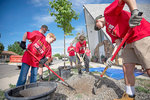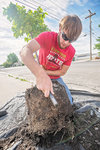Clear, 68° F
The second year of a long-term effort to replace Powell’s aging canopy planted six new trees at private residences. However, the Homesteader Roots program aims to plant 25 trees per year, …
This item is available in full to subscribers.
The Powell Tribune has expanded its online content. To continue reading, you will need to either log in to your subscriber account, or purchase a subscription.
If you are a current print subscriber, you can set up a free web account by clicking here.
If you already have a web account, but need to reset it, you can do so by clicking here.
If you would like to purchase a subscription click here.
Please log in to continue |
|


The second year of a long-term effort to replace Powell’s aging canopy planted six new trees at private residences. However, the Homesteader Roots program aims to plant 25 trees per year, leaving a long road to go before the group can celebrate.
Josh Pomeroy, local tree advocate and owner of Blue Ribbon Tree Service, is concerned people won’t get serious about the loss of the town’s mature trees until it’s too late.
“The learning curve is really gonna kick in once we start losing a lot of our canopy; trees we have assumed were going to be here forever,” Pomeroy said, warning, “We’re going to lose a lot of our mature trees that the homesteaders planted for us. We haven’t done a good job of thinking about what was going to be the next tree behind it.”
A combination of age, disease and insects, plus neglect for many years means a lot of the biggest, oldest trees in town are at the end of their life cycles, he said. Many of the oldest trees were planted by homesteaders in the area; within the next 20 years they’ll mostly be gone, he said.
In the coming years, the emerald ash borer will have made in-roads into Wyoming, possibly wiping out the ash trees growing in the city. About 60% of the trees in the city are green ash, a species under attack by the invasive insect.
“There will be a gap, unless we act now,” Pomeroy said.
The grassroots organization charges homeowners a one-time fee of $50 for the tree, which is about 20% of a typical fee for the service. The rest of the funding comes from generous donors. Additionally, Homesteader Roots volunteers help care for the trees through the first year — a vulnerable time for the plants.
Qualifying species for the program are hearty, slow-growing hardwoods, which will help the city develop a new bio-diverse urban forest. The selections are based on trees that grow well in the area and have a long life span. Species like bur oak, shade-master honeylocust, Ohio buckeye and green-spire littleleaf lindens are on the list, but those offered from year to year depend on availability.
This year, residents chose two different varieties of lindens and Japanese ivory silk lilac trees. “They’re definitely trees that Powell doesn’t have a high percentage of,” Pomeroy said.
Boy Scouts from Troop 26, in Powell, volunteered to help plant the six new trees.
“We were happy to have the youth there to help and learn. It’s always fun to teach [young people] how to plant a tree,” he said.
Homesteader Roots needs to build awareness, Pomeroy added, to attract both interested homeowners and donors.
“This program only works if we continue to get those donations,” he said.
Applications to receive trees through the Homesteader Roots project are available at businesses throughout Powell as well as City Hall.